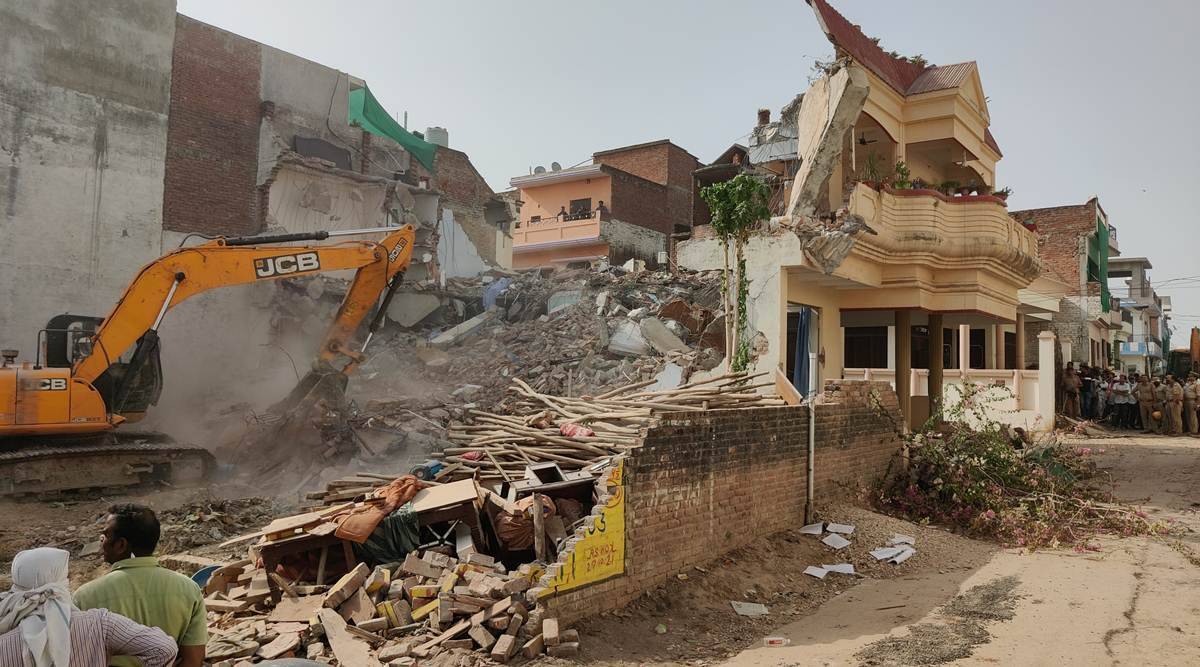4 reasons why there is no justification for bulldozer politics

Experts believe that demolishing houses of protestors is against the rule of law and deprives people of fundamental rights.
Basil Islam | TwoCircles.net
NEW DELHI — Following the violent clampdown by the Uttar Pradesh government on protests triggered by now-suspended BJP spokesperson Nupur Sharma’s controversial remarks on Prophet Muhammad, the authorities razed the houses of many protesting Muslims. The Prayagraj Development Authority demolished Javed Muahmmed’s home on Sunday, June 12. Muhammed is the national leader of the Welfare Party of India and the father of student activist Afreen Fatima. This is not an isolated incident. Private properties of the protesters who allegedly incited violence got demolished in many parts of the country, including Jahangirpuri in Delhi, Khargone in Madhya Pradesh, and other parts of Uttar Pradesh. On June 14th, a petition letter was submitted to the Supreme Court of India by former judges and senior lawyers of the Supreme Court and appealed to the court to take suo moto cognizance of the acts by the Uttar Pradesh government on Muslim protesters.
Here are some reasons why law experts believe that demolishing the houses of protesters is a wrong practice, is against the rule of law and goes against fundamental rights:
1. Actions targeted at the Muslim community
The demolition drives carried out by different state administrations at various times targeted the minority Muslim community. In all instances, only the Muslim houses were demolished, alleging them to be the perpetrators of violence. It is not clear in every case who instigated violence but is ample proof to indicate that people from both the communities were involved in clashes.
The petition by the former judges to the Supreme Court specifically mentioned this aspect. “Instead of giving protestors an opportunity of being heard and engaging in peaceful protests, the UP state administration appears to have sanctioned taking violent action against such individuals. “The coordinated manner in which the police and development authorities have acted lead to the clear conclusion that demolitions are a form of collective extra-judicial punishment, attributable to a state policy which is illegal,” the letter reads.
2. No proper procedures followed
The authorities cannot demolish someone’s property, alleging their involvement in a crime. A competent court order is required to act upon. The pattern emerging is that in many cases, notices are issued, but the demolition is timed with a protest, and a particular section is targeted, giving the subject no time to appeal.
“If the dispute is on his property, then a proper court order is required, and notice has to be served on the concerned person, but demolition of a property without notice or for a different crime has no legality in the eyes of the law,” former Chief Justice of India Justice R M Lodha told India Today.
3. Already challenged in the courts
Bulldozing homes under the pretext of alleged violations of building laws is under considerable challenge in three courts at this moment viz the Supreme Court, Allahabad High Court, and the Madhya Pradesh High Court. The actions have been challenged before the courts citing violations of fundamental rights and due process. The victims of earlier demolitions challenge the arbitrary use of bulldozers by authorities in the absence of legitimate grounds for conducting the exercise.
Former Allahabad High Court Chief Justice Govind Mathur told The Indian Express that it is impermissible to demolish a house on a Sunday when the residents are in custody, giving the subject no time to appeal. “It is not a technical issue but a question of the rule of law,” Mathur said.
4. Surpasses the rule of law
The actions by the authorities without due process test the spirit of the Constitution and the rule of law. The accused were given no time to raise objections in front of the court regarding the demolition. When the Supreme Court ordered the Uttar Pradesh government to withdraw orders to recover alleged damages to public properties from anti-CAA protesters, the government devised the Uttar Pradesh Recovery of Damages to Public and Private Property Bill in 2020. This is how the state surpassed the checks put by the judiciary. The high-handedness of police on peaceful protests and inaction toward the instigators of violence is fueling the tense situation in the state.
“Such a brutal clampdown by a ruling administration is an unacceptable subversion of the rule of law and a violation of the rights of citizens, and makes a mockery of the Constitution and fundamental rights guaranteed by the state,” the letter addressed to Chief Justice of India from former judges and senior lawyers said.
Basil Islam is an independent journalist and researcher based in South India. He tweets at @baasiie
